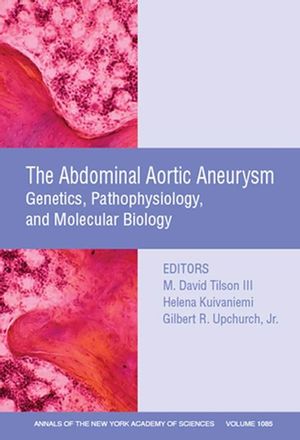Abdominal Aortic Aneurysm: Genetics, Pathophysiology, and Molecular Biology, Volume 1085ISBN: 978-1-57331-657-6
Paperback
352 pages
November 2006, Wiley-Blackwell
 |
||||||
Keynote Remarks: Challenges and Opportunities in Abdominal Aortic Aneurysms Research: Momtaz Wassef, PhD.
Part I: Epidemiology and Initiatives to Prevent Death from Rupture:.
1. Epidemiology of Aortic Aneurysm Repair in the United States from 1993 to 2003: Gilbert R. Upchurch, Jr., MD.
2. A Biomechanics-Based Rupture Potential Index for Abdominal Aortic Aneurysm Risk Assessment: Demonstrative Application: David Vorp, PhD.
3. Long-term Relationship of Wall Stress to the Natural History of AAAs (Finite Element Analysis and Other Methods): Mark F. Fillinger, MD.
4. A Summary of the Contributions of the VA Cooperative Studies on Abdominal Aortic Aneurysms: Frank Lederle, MD.
5. Pharmacological Approaches to Prevent AAA Enlargement and Rupture: Tim Baxter, MD.
6. Should Usual Criteria for Intervention in Abdominal Aortic Aneurysms be “Downsized” Considering Reported Risk-Reduction With Endovascular Repair?: Marc Schermerhorn, MD.
Part II: Animal Models: Pathophysiology and Biomechanical Aspects:.
7. Pathophysiology of Abdominal Aortic Aneurysms:Insights from the Elastase-Induced Model in Mice with Different Genetic Backgrounds: Robert Thompson, MD, FACS.
8. Regression of Abdominal Aortic Aneurysm by Inhibition of c-Jun N-Terminal Kinase in Mice: Koichi Yoshimura, MD, PhD.
9. Role of the Renin-Angiotensin System in the Development of Abdominal Aortic Aneurysms in Animals and Humans: Alan Daugherty, MD, PhD.
10. AAA Disease: Mechanism, Stratification and Treatment: Ronald L. Dalman MD.
11. Refinements in Mathematical Models to Predict Aneurysm Growth and Rupture: Ramon Berguer, MD, PhD.
Part III: Enzymology - Another Approach to Interventional Pharmacology:.
12. AAA – A complex Multifactorial Disease: Interactions of Polymorphisms of Inflammatory Genes, Features of Autoimmunity, and Current Status of MMPs: William Pearce, MD.
13. The Intraluminal Thrombus as a Source of Proteolytic Activity: Jesper Swedenborg, MD, PhD.
14. Activators of Plasminogen and the Progression of Small Abdominal Aortic Aneurysms: Jes Lindholt, MD, PhD.
15. Is There a Role for Macrophage 5-Lipoxygenase Pathway in Aortic Aneurysm Development in Apolipoprotein E Deficient Mice?: Colin Funk, PhD.
16. Do Cathepsins Play a Role in AAA Pathogenesis?: Galina K. Sukhova, PhD.
17. MMP-2: The Forgotten Enzyme in Aneurysm Pathogenesis: Gillian W Cockerill PhD.
Part IV: Biological Aspects of Endovascular Devices to Repair AAA:.
18. Current Status of Endovascular Repair of Infrarenal Abdominal Aortic Aneurysms in the Context of 50 Years of Conventional Repair: Norman R. Hertzer, MD.
19. Animal Models of Endovascular AAA Repair: Peter Faries, MD, FACS.
20. Aortic Aneurysm, Thoracoabdominal Aneurysm, Juxtarenal Aneurysm, Fenestrated Endografts, Branched Endografts, Endovascular Aneurysm Repair: Roy Greenberg, MD.
21. Vibrometry: A Novel Non-invasive Application of Ultrasonographic Physics to Estimate\Wall Stress in Native Aneurysms: Gautam Agarwal, MD.
22. Combining Open and Endovascular Approaches to Complex Aneurysms: Scott A. LeMaire, MD.
23. Engineering Improvements in Endovascular Devices: Design and Validation: David M. Williams, MD.
Part V: Genetics and Immunology in AAA:.
24. The Abdominal Aortic Aneurysm (AAA) is a Specific Antigen-driven T-cell Disease: Chris D. Platsoucas, PhD.
25. Genes predisposing to rapid aneurysm growth: Janet Powell, MD, PhD.
26. Genetic Basis of Thoracic Aortic Aneurysms and Dissections: Potential Relevance to.
Abdominal Aortic Aneurysms: Dianna Milewicz, MD, PhD.
27. Structural and Functional Genetic Disorders of the Great Vessels and Outflow Tracts: Craig Basson, MD, PhD.
28. Genome-wide approach to finding AAA susceptibility genes in humansa: Helena Kuivaniemi, MD, PhD.
29. The Candidate Gene Approach to Susceptibility for Abdominal Aortic Aneurysm (AAA): TIMP1, HLA-DR-15, Ferritin Light Chain, and Collagen XI-ALPHA-1: M. David Tilson, MD



